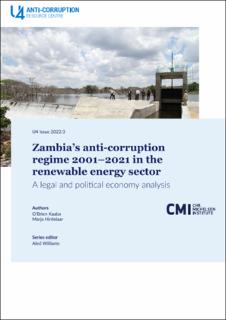| dc.contributor.author | Kaaba, O'Brien | |
| dc.contributor.author | Hinfelaar, Marja | |
| dc.date.accessioned | 2022-02-11T17:24:16Z | |
| dc.date.available | 2022-02-11T17:24:16Z | |
| dc.date.issued | 2022-01-01 | |
| dc.identifier | oai:www.cmi.no:8179 | |
| dc.identifier.citation | Bergen: Chr. Michelsen Institute (U4 Issue 2022:3) | |
| dc.identifier.uri | https://hdl.handle.net/11250/2978553 | |
| dc.description.abstract | In the Zambian context anti-corruption initiatives depend upon the political will and disposition of the president. For an anti-corruption order to be established, especially in the renewable energy sector, structural reforms are needed. The reforms recommended here include reducing the executive powers of the president, debarring corrupt renewable energy companies, enhancing the role of international organisations, and promoting investigative journalism to track and expose corruption in the energy sector. | |
| dc.language.iso | eng | |
| dc.publisher | Chr. Michelsen Institute | |
| dc.relation | U4 Issue | |
| dc.relation | 2022:3 | |
| dc.relation.ispartof | U4 Issue | |
| dc.relation.ispartofseries | U4 Issue 2022:3 | |
| dc.relation.uri | https://www.cmi.no/publications/8179-zambias-anti-corruption-regime-2001-2021-in-the-renewable-energy-sector-a-legal-and-political | |
| dc.title | Zambia’s anti-corruption regime 2001–2021 in the renewable energy sector. A legal and political economy analysis | |
| dc.type | Research report | |
